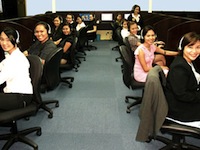Historically, the Philippines has always been an occupied country. Spain ruled the islands for 333 years, followed by 45 years with the United States in 1898 with a brief period of occupation by the Japanese during World War II until it was liberated by the United States again. On July 4, 1946, the United States granted the Philippines its independence as a sovereign country. Since then, American culture has always taken a frontline in the lifestyle of the modern Filipino.
The most obvious reason why Filipinos excel in the call center world is their excellent verbal and written communication skills in English. The country is in itself the only English-speaking nation in East Asia. Though there are 120 up to 175 disparate languages (or locally known as dialects) in the country, English stands out as the common one. It is the language of choice used in schools for all levels. No matter where you go in the Philippines, when you speak English to the locals, they will respond back in an understandable manner. When Filipinos speak English, we have one of the most neutral speaking styles in the world. Filipinos talk in a smooth way that most Americans immediately understand, with a describable “calm” manner of speaking.
The Philippines’ style of doing business has always mimicked the United States. Our form of government, accounting practices, and legal policies, to name a few, are very similar to the American system. Even the country’s lifestyle reverberates “American” as loudly as it can: Starbucks, McDonald’s, Pizza Hut, Krispy Kreme, TGI Friday’s, Hard Rock Cafe, to say the least, are prevalent in the urban areas. It is not difficult for an American to insert himself into Philippine society simply because everything you see is as American as it can be.
Being considered a developing country, Filipinos always find ways to fix things and use them until they get old or broken, or troubleshoot problems until there are no escapable solutions available anymore. This trait makes Filipinos frugal with the things they own and do, at home and the workplace. Hence, creativity, sound judgment and common sense are often used in resolving issues and fixing broken things regardless of each one’s craft or expertise.
The culture of the Philippines is all about respect for the elder, including elder brothers and sisters. Filipinos are non-confrontational and are generally considered to be a submissive lot. Everyone who is older is considered a big brother, big sister, aunt, uncle or grandparent, translated into its native language or dialect. The words “po” and “ho” (and its versions in the hundred-plus dialects) are always inserted in a sentence to signify respect to the elder, much like putting the Japanese suffix “san” in people’s names. So, it is common practice for Filipinos to address Americans with “sir” or “ma’am” repeatedly, and in almost every sentence. It’s just the way Filipinos talk.
Now, put these characteristics and traits inside the call center and you’ve got one of the most respectful, “the customer is always right,” and “try as much as you can to solve it” type of service delivery in the world. The Philippine culture fits perfectly with the demands of customer service in the call center world. When an irate customer yells, the Filipino always says “I’m sorry” and continues to be respectful through the course of the entire conversation. When a customer complains, the Filipino finds all means available to fix the problem, sometimes going out of his way to do so.
Outsourcing customer service and technical support to the Philippines is probably one of the best decisions a U.S.-based company can do. Only new technology – systems and procedures – including the client’s style of doing business, stand out as something the American company needs to teach the Filipino. Other than that, everything else about communication and customer service is in place. In a world where fiscal demands outweigh the natural order of things, a U.S. company’s best bet is to use the Philippines as its primary means to outsource; because you can’t go wrong with an American culture and system already in place for the past 100 years.
(Re-posted from Good News Pilipinas by Raffy Pekson II)
